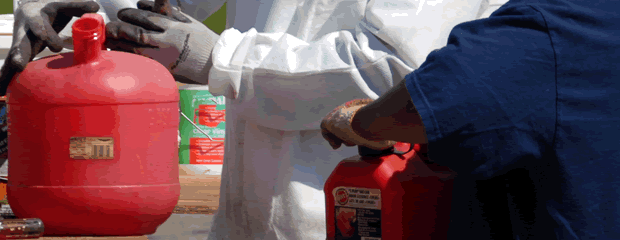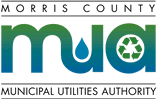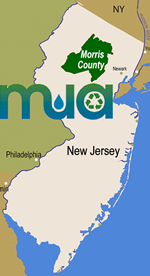Transfer Station Info (Tip Fee $113.00/ton)
- Mt. Olive Mon-Fri 7:30am-3pm; Sat 7:30am-11am
- Parsippany Mon-Fri 7am-3pm; Sat 7:30am-11am
- Closed Sundays and Major Holidays
- No Rental Trucks
- Payment by Account, Check, Credit Card. No Cash

F.A.Q. Gasoline
The MCMUA operates one of NJ's most comprehensive household hazardous waste (HHW) programs. This F.A.Q. page and information on hazardous materials is intended as a guide about HHW materials as well as the MCMUA's HHW program. This information is a general guide and does not constitute official rule, regulation or law.
Hazardous Waste Materials
- Adhesives
- Aerosols
- Antifreeze
- Appliances (CFCs)
- Art & Crafts
- Asbestos
- Batteries (Auto & Boat)
- Batteries, Household (dry cell)
- Cell Phones
- Compressed Gas Cylinders
- Driveway Sealer
- Electronics
- Fire Extinguishers
- Fluorescents
- Gasoline
- Medical Waste
- Kerosene
- Mercury
- Motor Oil & Filters
- Muriatic Acid (HCl)
- Paints & Stains
- Pesticides
- Photo Chemicals
- Pool Chemicals
- Propane
- Rock Salt
- Smoke Detectors
- Solvents
- Wood with Lead Paint
Hazards
- Gasoline is highly flammable and can be explosive.
-
Gasoline contains benzene, a known carcinogen. Benzene and other toxic compounds found in gasoline
vaporize readily and can be inhaled.
Handling
- Store gasoline in a container that is approved for gasoline storage.
- Do not fill up the container to the top; leave some air space to allow for expansion.
- Store gasoline in a cool, dry place, away from any motor driven machine that could cause sparks, including washers and dryers. Keep out of direct sunlight.
- Store at ground level, not on a shelf to minimize the danger of falling and spilling.
- Never open or use near open flames or source of ignition such as sparks or cigarettes.
- Always open gasoline containers and use gasoline in a well-ventilated area, preferably outdoors, away from children and animals.
- Do not store gasoline in a car trunk. There is a threat of explosion from heat and impact.
- Do NOT dispose of down the drain, into surface water, or in the trash.
-
Do NOT mix with ANY other material, including antifreeze and used oil.
Management Options
-
Save for HHW collection or take to a commercial hazardous waste facility.


